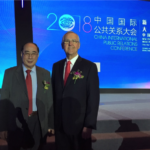Knowing the Business of the Business
by Robert W. Grupp, Graduate Program Director, Global Strategic Communication, University of Florida
The Price of Entry into the C-Suite
What does it takes to advance into a position of influence among senior management?
Bill Margaritis is executive vice president, corporate affairs for Hilton Worldwide. He oversees corporate branding, internal and external corporate communication, government relations and corporate responsibility globally. Previously, he spent nearly 16 years at FedEx as SVP, global communication and investor relations.
“This sort of proverbial seat at the table that everybody talks about has changed dramatically. Today, it’s all about value creation, credibility and leadership,” Margaritis said. “That’s what you must have to speak the language of executives. You have to understand the financial aspects of the corporation. You have to understand how strategy is conceived; what is it, how you execute; how you put analytics behind your programming.”
Business-Driven Curriculum
Knowledge of the business and how it operates is essential, a prerequisite to succeed and advance in many professions, which leads me to believe the business of business is the business.
This issue is a continuous topic among faculty in the UF online master’s of mass communication specializing in global strategic communication program. Executives, including our own Advisory Council, emphasize the need for basic business acumen no matter how well you communicate.
“I agree with you that the business of business is business,” Margaritis said. “In fact, that’s one of the biggest challenges in recruiting. A lot of folks coming out of college don’t have a very strong business acumen.”
This trend led to the creation of the course Financial and Business Essentials and the logic behind our Capstone experience. Students are graded on the degree to which their communication campaigns align with client business objectives. Faculty emphasize the importance of integration, the need for communicators to be integrators in complex, global organizations. This skill gives us a much broader role in reaching across various departments like human resources, finance, legal, IT, and marketing to achieve an integrated, holistic strategy.
Employers say these skills and capabilities are essential for graduates with a master’s degree, and we continue to adapt our curriculum so graduates fulfill this requirement and advance in their careers.
Posted: June 17, 2016
Category: Grupp's Column


